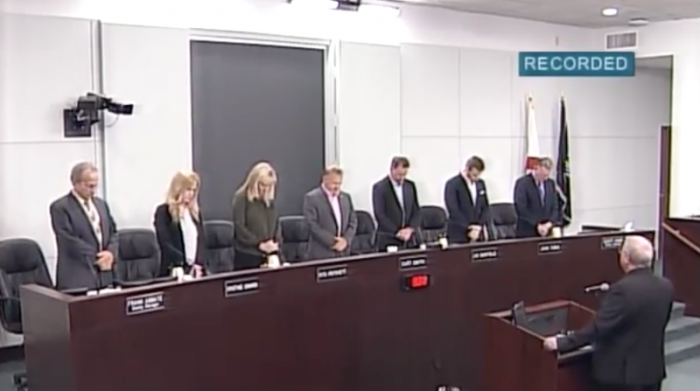Fla. county agrees to let atheists give invocations; pays $490K in legal settlement

A Florida county will now allow atheists to give invocations at the start of government meetings and was ordered to pay $490,000 as part of a recently agreed upon legal settlement.
The Brevard County Board of Commissioners reached a settlement with a group of plaintiffs who were prohibited from giving invocations at the meeting.
The plaintiffs will now be allowed to give invocations, according to an announcement by Americans United for Separation of Church & State.
The county will also dole out $430,000 in court costs and legal fees, as well as $60,000 in damages to the plaintiffs.
Alex J. Luchenitser, associate legal director for Americans United who helped represent the plaintiffs, supported the settlement.
“This settlement protects the religious freedom of everyone in Brevard County. No one should be excluded from participating in local government because of their beliefs about religion,” said Luchenitser in a statement released Tuesday.
In 2014, David Williamson of the Central Florida Freethought Community and other leaders asked to do an invocation at the beginning of the Brevard County Commissioners meeting.
In response, Brevard Commissioners unanimously approved a measure banning atheist invocations from opening their public meetings.
Brevard County Chair Mary Bolin Lewis told Williamson that he could offer an atheist invocation during the public comments section of the meeting.
"The prayer is delivered during the ceremonial portion of the county's meeting, and typically invokes guidance for the County Commission from the highest spiritual authority, a higher authority which a substantial body of Brevard constituents believe to exist," wrote Lewis at the time.
"The invocation is also meant to lend gravity to the occasion, to reflect values long part of the county's heritage, and to acknowledge the place religion holds in the lives of many private citizens in Brevard County."
Williamson and other plaintiffs sued the county in 2015, being represented by Americans United, the Freedom From Religion Foundation, and the American Civil Liberties Union.
In September 2017, the U.S. District Court for the Middle District of Florida ruled against the county and in July of last year, a three-judge panel of the U.S. Court of Appeals for the Eleventh Circuit also ruled against the invocation policy.
Circuit Judge Stanley Marcus authored the opinion, arguing that although Brevard County was allowed to have sectarian invocations, they could not exclude certain groups from giving them.
“Brevard County has selected invocation speakers in a way that favors certain monotheistic religions and categorically excludes from consideration other religions solely based on their belief systems. Brevard County’s process of selecting invocation speakers thus runs afoul of the Establishment Clause,” Marcus wrote in his decision last year.
“Secular humanists are far from the only group viewed with disfavor … some of the Commissioners and former Commissioners have testified unambiguously that they would not allow deists, Wiccans, Rastafarians, or, for that matter, polytheists to deliver prayers, and that they would have to think long and hard before inviting a Hindu, a Sikh, or a follower of a Native American religion.”





























